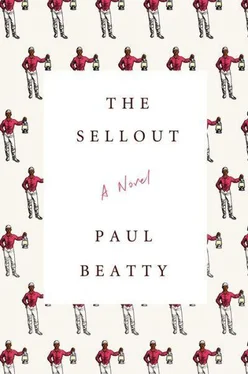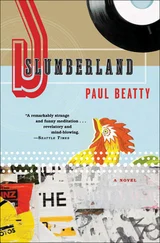I was surprised how many of the children carried lighters, but no matter how many attempts were made to start the bonfire, the water-soaked wood wouldn’t catch. Charisma ordered a group of students to the storage shed. They returned bearing cardboard boxes, the contents of which they dumped on the ground. Soon there was a pyramid of books about five feet wide and three feet high and rising.
“Well, what the fuck are you waiting for?”
She didn’t have to ask twice. The books caught like kindling, and the flames of a good-sized bonfire licked the sky as the students happily roasted marshmallows on number two pencils.
I pulled Charisma aside. I couldn’t believe she was burning books. “I thought school supplies were in short supply.”
“Those aren’t books. Those came from Foy Cheshire. He has a whole curriculum called ‘Fire the Canon!’ featuring such rewritten classics as Uncle Tom’s Condo and The Point Guard in the Rye that he’s pushing on the school board. Look, we’ve tried everything: smaller classrooms, longer hours, bilingual, monolingual, and sublingual educations, Ebonics, phonics, and hypnotics. Color schemes designed to promote the optimum learning environment. But no matter what warm-to-medium-cool hues you paint the walls, when it all comes down to it, it’s white teachers talking white methodology and drinking white wine and some wannabe white administrator threatening to put your school into receivership because he knows Foy Cheshire. Nothing works. But I’ll be damned if the Chaff Middle School will hand out copies of The Dopeman Cometh to its students.”
I kicked a partially burned tome away from the fire. The cover was charred but still readable, The Great Blacksby , page one of which was:
Real talk. When I was young, dumb, and full of cum, my omnipresent, good to my mother, non-stereotypical African-American daddy dropped some knowledge on me that I been trippin’ off of ever since.
Using my lighter, I finished torching the book myself and held its flaming pages under the marshmallow on a wooden ruler that Sheila had kindly offered me. She had fashioned a leash from a jump rope and was stroking the calf on the head, while the Latino was trying to surgically reattach his testicles with Elmer’s glue and a paper clip, until Charisma grabbed him by the neck and stood him up.
“You kids have a good Career Day?”
“I want to be a veterinarian!” Sheila answered.
“That’s gay,” countered her Latino nemesis, who was juggling the gonads with one hand.
“Juggling is gay!”
“Calling people who call you ‘gay’ just because you called them ‘gay’ is gay!”
“Okay, that’s enough.” Charisma scolded. “My God, is there anything you kids don’t think is gay?”
The fat boy thought for a long moment. “You know what’s not gay … being gay.”
Laughing through her tears, Charisma collapsed on a beige fiberglass bench as the three o’clock bell rang; it’d been a long day. I sidled in next to her. The clouds finally caved in and the drizzle turned into a steady downpour. The students and faculty ran to their cars, the bus stop, and the waiting arms of their parents, while we sat there in the shower like good Southern Californians, umbrellaless and listening to the raindrops sizzle in the slowly dying fire.
“Charisma, I thought of a way to get the kids to behave and respect each other like they do on the bus.”
“How?”
“Segregate the school.” As soon as I said it, I realized that segregation would be the key to bringing Dickens back. The communal feeling of the bus would spread to the school and then permeate the rest of the city. Apartheid united black South Africa, why couldn’t it do the same for Dickens?
“By race? You want to segregate the school by color?”
Charisma looked at me like I was one of her students. Not stupid, but clueless. But if you asked me, Chaff Middle School had already been segregated and re-segregated many times over, maybe not by color, but certainly by reading level and behavior problem. The English as a Second Language speakers were on a different learning track than the English When and Only If I Feel Like It speakers. During Black History Month, my father used to watch the nightly television footage of the Freedom buses burning, the dogs snarling and snapping, and say to me, “You can’t force integration, boy. The people who want to integrate will integrate.” I’ve never figured out to what extent, if at all, I agree or disagree with him, but it’s an observation that’s stayed with me. Made me realize that for many people integration is a finite concept. Here, in America, “integration” can be a cover-up. “I’m not racist. My prom date, second cousin, my president is black (or whatever).” The problem is that we don’t know whether integration is a natural or an unnatural state. Is integration, forced or otherwise, social entropy or social order? No one’s ever defined the concept. Charisma was giving segregation some thought, though, as she slowly rotated the last of the marshmallows in the flame. I knew what she was thinking. She was thinking about how her middle-school alma mater was now 75 percent Latino, when in her day it was 80 percent black. Thinking about listening to her mother, Sally Molina, tell stories about growing up in segregated small-town Arizona in the 1940s and ’50s. Having to sit on the hot side of the church, the farthest away from Jesus and the fire exits. Having to go to the Mexican schools and bury her parents and her baby brother at the Mexican cemetery outside of town on Highway 60. How when the family moved to Los Angeles in 1954, the racial discrimination was more or less the same. Except that unlike the black Angelenos, they could at least use the public beaches.
“You want to segregate the school by race?”
“Yeah.”
“If you think you can do it, go ahead. But I’m telling you, there’s too many Mexicans.”
I can’t speak for the children, but driving home, the newly castrated calf in the front seat of the pickup, his head out the window catching raindrops on his tongue, I left Career Day as inspired as I’d ever been and with renewed focus. What was it Charisma said, “It’s like the specter of segregation has brought the city of Dickens back together again.” I decided to give my new career as City Planner in Charge of Restoration and Segregation another six months. If things didn’t work out, I could always fall back on being black.
It rained buckets that summer after Career Day. The white boys at the beach called it “bummer,” as in the “Bummer of ’42.” The weather reports were nothing but nonstop references to record rainfall and continuous cloud cover. Every day, at around nine thirty, a low-pressure system settled over the coastline and it’d pour off and on until early evening. Some folks won’t surf in the rain, even more refuse go out after a storm, worried about contracting hepatitis from the sludge and all the polluted runoff that flows into the Pacific after a heavy downpour. Personally, I like catching waves in the rain, fewer fuckers in the lineup, no windsurfers. Stay away from the arroyos near Malibu and Rincon, which tend to overflow with septic waste, and you’ll be fine. So that summer I didn’t worry about fecal matter and microbes. I agonized over my satsumas and segregation. How do you grow the world’s most water-sensitive citrus tree under monsoon conditions? How do you racially segregate an already segregated school?
Hominy, the race reactionary, was no help. He loved the idea of bringing back segregated education, because he thought the idea would make Dickens more attractive to white resettlement. That the city would return to being the thriving white suburb of his youth. Cars with tail fins. Straw hats and sock hops. Episcopalians and ice cream socials. It would be the opposite of white flight, he said. “The Ku Klux influx.” But when I’d ask him how, he’d just shrug and, like a conservative senator without any ideas, filibuster me with unrelated stories about the good ol’ days. “Once, in an episode called ‘Pop Quisling,’ Stymie tried to avoid taking a history test he hadn’t studied for by setting his desk on fire, but of course he ended up burning down the entire school and the gang had to take the test on top of a fire truck ’cause Miss Crabtree didn’t play that shit.” Then there was the guilt that comes along with being a segregationist. I stayed up nights trying to convince Funshine Bear, whose fur over the years had mottled and turned from sun-ray yellow to toe-jam brown, that the reintroduction of segregation would be a good thing. That like Paris has the Eiffel Tower, St. Louis the Arch, and New York an insanely huge income disparity, Dickens would have segregated schools. If nothing else, the Chamber of Commerce brochure would look attractive. Welcome to the Glorious City of Dickens: The Urban Paradise on the Banks of the Los Angeles River. Home to Roving Bands of Youth Groups, a Retired Movie Star, and Segregated Schools!
Читать дальше












